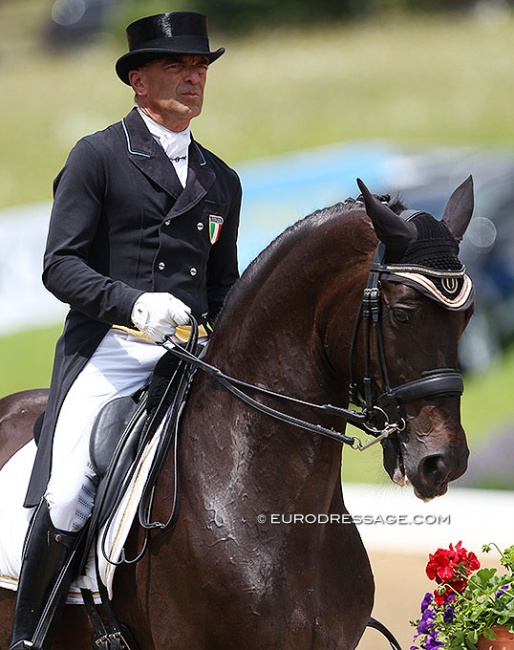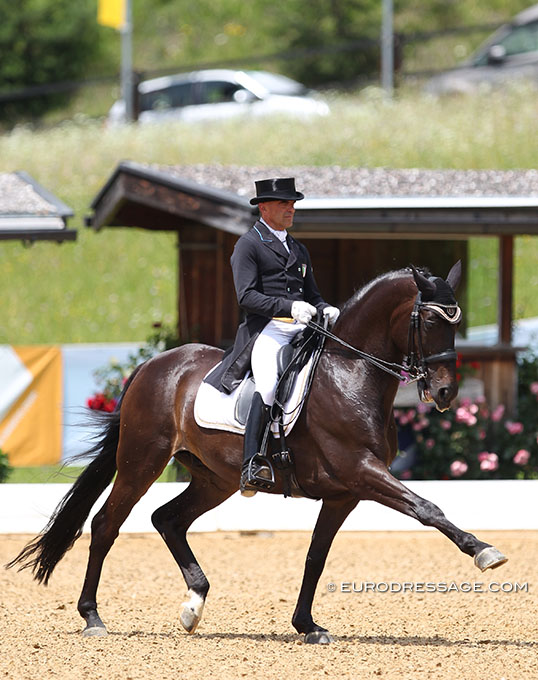
On 18 August 2020, the FEI Tribunal ruled in the doping case of Italian Grand Prix rider Pierluigi Sangiorgi and decided not to suspend him for two years or fine him.
His horse had tested positive to the anti-psychotic Aripiprazole at the 2019 CDI-W Lipica, but the rider argued it was contamination due to his grooming regularly peeing in the horse's stall.
Positive to Anti-psychotic
Gelo delle Schiave participated at the CDI-W in Lipica, Slovenia, from 24 to 26 May 2019 with Pierluigi Sangiorgi. The horse was selected for sampling during the event on 26 May 2019 and tested positive to Aripiprazole.
Aripiprazole is an antipsychotic used in the treatment of schizophrenia and bipolar disorders in humans. It has a similar chemical structure and/or similar biological effects as Benperidol, Droperidol, Trifluperidol, Carphenazine, Fluphenazine, Moperone and Zuclopenthixol, all classified as Banned Substances under the FEI Equine Prohibited Substances List (
The horse was provisionally suspended for a period of two (2) months, from the date of Notification (27 August 2019), until 26 October 2019. The Provisional suspension was not challenged, and the horse served the entire period of Provisional Suspension.
FEI Tribunal
Colombian 4* dressage judge and lawyer Cesar Torrente formed the one-person panel for the FEI Tribunal, which ruled in the matter.
On 23 July 2020, the FEI Tribunal chair nominated a one member panel for the case at hand. On 18 August 2020, the FEI provided its response in this case.
Grooms Pees in Stable
The rider argued that his horse tested positive to Aripiprazole because his groom was taking the drug and regularly peed in the horse's stable, thereby contaminating it.
Sangiorgi produced statements from the groom's doctors as well as an expert statement by "Dr. M. M., specialized in Toxicology".
The groom’s doctor confirmed that on 16 January 2019 the Groom was prescribed with the product “Abilify” containing Aripiprazole 1 mg/mL, which was to be taken orally 2/3 times a day during meals with a dosage of 10mg. The groom has been receiving therapy with Aripripazole for many months.
Each urination carried out in the horse’s box has a certain concentration of Aripripazole.
Through the expert report it has been argued that "the presumed quantity of Aripiprazole present in the biological liquid of Gelo delle Schiave cannot be correlated with a voluntary administration but with the intake of litter polluted with the active ingredient Aripiprazole.”
Sangiorgi's "expert ascertained with reasonable sufficiency beyond any possible doubt, that the active substance could have entered the Horse’s system through the ingestion of straw from the litter contaminated with the Groom’s urine. Urinating on the straw bedding of the Horse for several days, several times a day, had led, without any doubt, to an involuntary contamination of the Horse. This was also compatible with the very low level of substance found in the sample of the Horse."
Case in Front of FEI Tribunal
Sangiorgi faced a two year suspension if he was considered guilty for administering doping to his horse.
Where a Prohibited Substance is found in a horse’s sample a clear and unequivocal presumption arises under the EAD Rules that it was administered to a horse in a deliberate attempt to enhance its performance. As a result of this presumption of fault, Article 10.2 of the Page 7 of 12 EADM Rules provides that a Person Responsible with no previous doping offence, but who violated Article 2.1 of the EAD Rules is subject to a period of Ineligibility of two (2) years, unless he is able to rebut the presumption of fault.
The FEI allows the person responsible to provide clear and convincing evidence that proves how the Aripiprazole entered the Horse’s system. In this case, the PR has provided a statement from the Groom’s doctor and a copy of the prescription for the medication. In addition, the PR provided a statement from his expert witness with regard to the science of the case.
The FEI submitted that the FEI has consulted its expert on the scientific plausibility of the provided explanation taking into account the daily dosage of the medication that the groom was taking, frequency of the daily oral administration of the medication and the estimated concentration of Aripiprazole in the Horse’s sample.
Very Limited Available Data on Aripiprazole

Taking into account the daily dosage of the medication the Groom was taking, the amount of Aripiprazole entering the blood circulation and urine based on the oral bioavailability of Aripiprazole (approx. 87%), the max deposit of the medication through urination and if assuming the bioavailability in the horse is the same as in a human, the horse upon ingestion of all the Groom’s deposit, would excrete through urine a max concentration of 11 ng/ml which would be 4 times higher than the estimated concentration found in the horse’s sample (between Page 8 of 12 2.4ng/ml and 3.6ng/ml).
The FEI’s expert concludes that submitted explanation is scientifically plausible, however it is based on several assumptions as there is very limited available data on the substance of Aripiprazole and its pharmacokinetics.”
Stop Peeing in Horse's Stalls
The FEI was satisfied that Sangiorgi has established that he bore No Fault or Negligence for the Rule violation in accordance with Article 10.4 of the EAD Rules and the otherwise applicable period of Ineligibility (i.e. two years) shall be eliminated.
The FEI urges that grooms should stop peeing in horse's stables. In Sangiorgi's Tribunal report, the FEI states the following:
"The Tribunal is however concerned regarding the number of reoccurring cases where urinating in the horses’ boxes led to cross contamination of those horses. In the view of the Tribunal those are clearly cases which could easily be avoided if all stakeholders in equestrian sport were properly educated about the risks of this kind of contamination."
More often riders claim contamination from peeing in stalls as the explanation of their horses testing positive to doping. A more prominent case was show jumping rider Mario Deslaurier, whose horse Bardolina tested positive to an anti-depressant.
Sangiorgi has been disqualified from the 2019 CDI-W Lipica, but he faces no further sanctions.
Read the full FEI Tribunal report
Related Links
Pierluigi Sangiorgi Suspended after Testing Positive to Banned Substance
Pierluigi Sangiorgi Wins 2008 Italian Dressage Championships
Brugnoli and Sangiorgi Get Training Grants from FISE